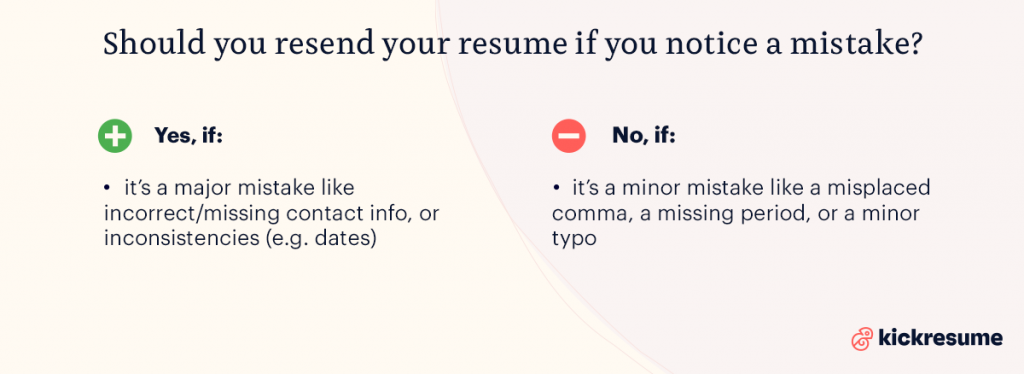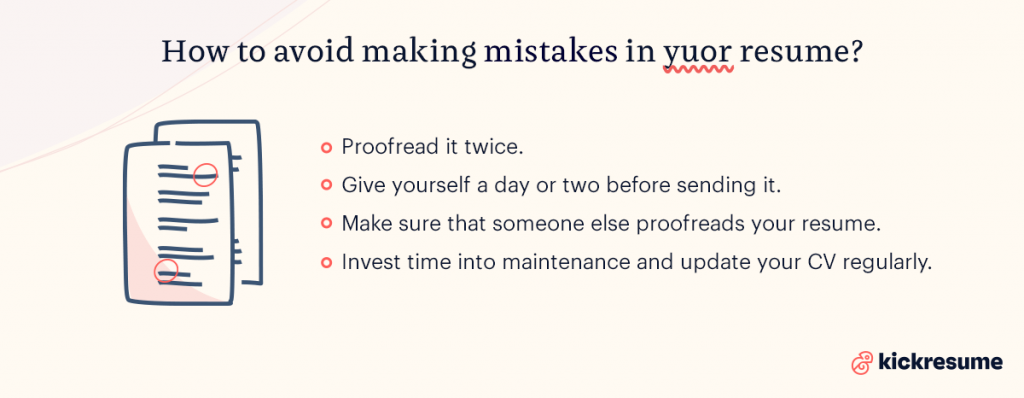Do you remember when ASOS printed 17,000 plastic bags with a typo, or when Trump sent out invitations with a spelling error? We all mess up time from time and it can happen to anyone. But there is one place where you definitely shouldn't make a mistake — and that's on your resume.
So what should you do when that happens and you submit a resume that has a typo or another mistake? Is there a reason to freak out and respond with a foot-long apology letter? Or should you just do nothing and hope nobody will notice?
Well, there’s no clear-cut solution. Each case deserves consideration on its own and asks for a different approach.
We’ve come to the conclusion that there are several possible scenarios when it comes to a faulty resume. Read on to figure out which one best fits your situation!
Small mistakes aren't a reason to worry
First, it’s important to realize that — unlike humans — not all mistakes were created equal.
Whereas some of them can get your resume thrown in the trash, other ones will easily go unnoticed.
So if you’ve already made a mistake, you need to assess them to decide about the action you'll take. Not all typos are as bad as an egregious misspelling of the hiring manager’s name.
Among minor resume mistakes you can count:
- a misplaced comma
- a missing period
- a minor typo
You definitely don’t want to call attention to a mistake that hardly stands out from your resume. If it’s not something that may spread confusion or misinformation that would be critical to the understanding of your resume, there’s no reason to point it out.
Recruiters also usually have too many resumes to review and fussing about a missing punctuation mark won’t be their primary concern. If perfect spelling isn’t one of the requirements for the job, no little typo should be able to overshadow your experience and qualifications.
Finally, learn from your own mistakes, and don’t forget to save the corrected version of your resume for future use. You never know when you’ll need it again and doing this upfront will pay off.

Detected some major errors? Resend your resume with style
There are certain situations when you need to take action and follow up with a new, fixed version of your resume.
Some of the larger mistakes that you can make are:
- incorrect/missing contact information
- inconsistencies (e.g. start and end dates, job titles, job duties)
But sending out a corrected version and saying “Sorry, there was a mistake in my resume” is probably the worst thing you can do.
It’s not very wise to draw attention to the mistakes you made. Rather than pointing out the mistakes and grammatical errors, simply present it as an “updated copy” or as your most recent document to replace any prior versions.
This is a smart and elegant way to avoid losing your reputation right from the outset.
Most recruiters will also focus on the content rather than the formatting, so it’s very unlikely that they will fish for mistakes in the first version of your resume.
ATS is your friend when you make a mistake in your resume
It’s good to know that most companies use automated technology to store resumes.
This means that when they receive a new file, the older version is simply deleted. So chances are your errors will fade into oblivion quite easily.
Here’s an example of how to resend your resume and save face after a major snafu:
Cover up your weaknesses
To draw the attention away from your errors even further, you can also enhance the updated version with a few added bullet points or a new resume section. However, these should relate to the position.
And if you're eventually invited to an interview, be sure to bring a properly formatted resume with you.
On the other hand, if you feel the need to be honest, you might also get away with something short and light like:
What to do once you've made a mistake
If you send your seemingly perfect resume, only to notice a typo or two later, don’t panic. Be kind to yourself, it’s not the end of the world.
Many people have actually been hired for jobs despite typos and other mistakes on their resumes. We’re all human beings and make mistakes on a daily basis. However, there are some methods that can eliminate the possibility they’ll ruin your resume.

What can you learn from this?
There are several lectures you can learn for the future:
- The next time you're sending your application, after running it through a spell checker program (such as Grammarly), proofread it once again.
- Give yourself a day or two after you finish writing your resume. Only then return to it and look for mistakes with fresh eyes.
- Also, make sure that someone else proofreads your resume. A couple of eagle-eyed friends scanning your resume before you apply for your next job can be very helpful. They'll be far more likely to catch any formatting, grammar, spelling, or timeline issues that you may have missed.
- Last but not least, invest some time into regular maintenance. Update your resume every now and then to have an up-to-date, thoroughly proofread career document. This will help you be ready the next time an unexpected opportunity comes your way.
FAQ: Did you write a mistake on your resume?
- What are the most common mistakes people make on their resumes?
Missing commas, missing words, misspelling a recruiter’s name.
- What should you do if you send the wrong version of your resume?
Send a new email with the correct resume and don’t address your mistake openly, but rather present it as an updated version.
- What if you made a mistake in an email to which you're attaching your resume?
In this case, just hope that the busy hiring manager won’t have time to notice any mistakes and will focus on the resume and cover letter right away. Don’t send another email!
This article was recently updated. The original article was written by Jakub Kaprál in 2018.



